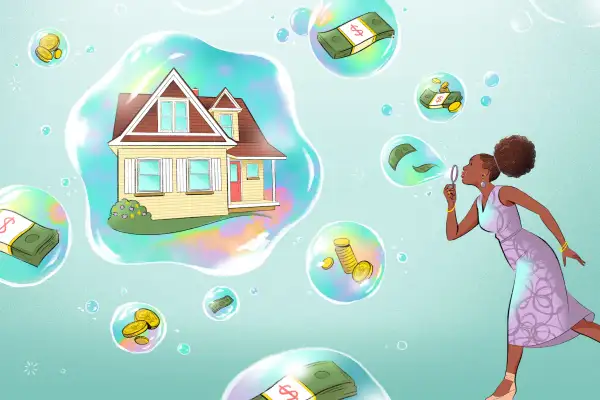Bubble or No Bubble? What History Tells Us About the Likelihood of a Housing Crash This Year

As home values continue to rise at a double-digit pace, confidence in the housing market is eroding.
Only 30% of respondents in Gallup’s annual Economy and Personal Finance Poll said it was a good time to buy a house, a whopping 23 percentage point drop from last year. What’s more, in a recent survey by real estate brokerage Clever Real Estate, 45% of likely home sellers said they believe there is a housing bubble that might pop this year.
Concerns over a housing bubble have been brewing for months. In March, the Federal Reserve Bank of Dallas reported an increasing concern over the possibility of a bubble as home prices continued to increase at a fast pace.
The fear of a new bubble is understandable. Most people remember the devastating effect the last housing collapse, including more than 6 million households that lost homes to foreclosure.
However, those worried about a 2008-style housing bubble may be better served looking further back in time for how today’s market may play out.
Why today’s market is different from the marker in 2008
In the years leading up to the 2008 collapse, deregulation in the financing industry led to easy access to credit for many homebuyers who would not have previously qualified for a loan. This caused demand to boom, which in turn pushed home prices higher and led to investor speculation and overbuilding.
Loose regulations meant these same subprime borrowers were often sold alternate loan products such as adjustable-rate mortgages or even more exotic products such as those featuring balloon payments. When those rates became adjustable and started increasing dramatically, many owners could no longer afford the monthly payments and went into foreclosure.
Today’s market looks very different.
Based on the fundamental underpinnings of today’s housing market, a market crash similar to the 2008 bubble bursting is highly unlikely, says Bill McBride, real estate analyst and author of the CalculatedRisk Newsletter.
The 2008 bubble was characterized by homeowners with adjustable-rate loans with a loan to value ratio of 105% and 1% teaser rates, notes McBride. Today, ARMs are regulated and have caps in place to prevent interest rates from increasing uncontrollably.
Eventually, home prices dropped at the same time ARM interest rates started to rise. People couldn’t afford to pay mortgages that were worth more than their homes were worth, which led to a large number of foreclosures. Today, homeowners have a lot more equity in their homes and can absorb a decrease in home prices without losing all their home equity.
“If prices went down 5%-10%, people would still have equity and very few people would be under distress,” says McBride. Adding, “I just don’t see how we can get cascading price declines.”
Instead, McBride believes it is much more likely that our present housing market will behave in a similar fashion to the 1979-1982 market, which basically saw a market cooldown without a crash in home prices or a large number of foreclosures.
The 1979-1982 period was characterized by inflation even higher than today, with consumer price growth peaking at 13.5% in 1980. As a result, the Federal Reserve, led by then-chairman Paul Volcker, increased the federal funds in a bid to control inflation. Mortgage rates climbed to a high of 18.63% in October of 1981 before starting a slow and steady decline. Today, the Fed is also increasing the federal funds rate to stem inflation that has reached its highest level in over 40 years and mortgage rates are rising as a result.
Another similarity to today’s market is demographics-led demand. Like millennials today, in 1979, the baby boomer generation was the largest ever cohort to enter the housing market at the time and drove huge demand.
Housing market fundamentals that make a 2008-style crash unlikely
Demographics and homebuyer demand
Today's high demand for housing is largely driven by a massive millennial generation that is coming into the prime buying age. That demand, however, has so far been running up against a severe lack of housing inventory that dates back to the end of the Great Recession.
The building boom that helped fuel the housing market before the bubble burst in 2008 slowed significantly afterward. The available housing inventory in 2010 was a 12-month supply, twice the 6-month supply considered to be a sign of a healthy market. By the end of 2019, there was around a 4-month supply of homes for sale. At the current pace of sales, there is just a 2-month supply of homes available for sale.
A housing market that has enough buyer demand to snap up available for-sale homes is unlikely to see prices fall dramatically, notes Skylar Olsen, principal economist at mortgage start-up Tomo.
Inflation and interest rates
Inflation has been increasing over the last year as a result of the economic disruption caused by the COVID-19 pandemic, supply chain constraints and, more recently, the Russian invasion of Ukraine. In April, the rate of inflation was above 8% for the second month in a row. As a result, the Fed is raising the federal funds rate to try to curb inflation.
A by-product of the Fed’s action is that current mortgage rates have increased more than 2 percentage points over the first four months of the year.
However, in an overheated housing market like today’s, high inflation and rising interest rates may not be all bad, according to George Ratiu, senior economist for Realtor.com.
“As I’m seeing prices adjust already in response to higher rates, higher inflation and new supply, it tells me the market actually seems to be moving toward normalization without a bubble-like bursting,” Ratiu says.
Home equity
Home prices have been increasing by double digits for nearly two years. This March, home prices jump by 20.9% compared to the same month last year, the largest year-over-year increase recorded by real estate data provider Corelogic in its 45-year history.
Most experts say this rate of home price growth is unsustainable, with many predicting that by this time next year growth will slow and fall into the single digits, but prices will not decline.
Although higher home values may push some potential buyers out of the market, for homeowners it means an increased source of tappable wealth that can be used in case of an unexpected setback.
Homeowners gained a total of $3.2 trillion in equity in 2021, or an average of $55,000 per borrower. According to CoreLogic, that’s a 29% increase from December 2020.
Negative equity — when a home’s value falls below the outstanding balance on the mortgage — dropped by nearly 25% year-over-year, with 1.1 million homeowners underwater on their mortgage at the end of last year. It’s the lowest level of negative equity in over twelve years, according to CoreLogic.
Having enough equity built up means homeowners are better equipped to absorb home price declines or use that equity to cover expenses that may come up without necessarily putting their home at risk.
If we’re not heading for a bubble, what then?
McBride doesn’t see a housing market bust happening at all, but rather a slowing down similar to what happened between 1979 and 1982, with fewer home sales, less home price growth and less demand. The question is when and how much the market will slow.
There are signs that a cooling may already be starting. Both existing and pending home sales are so far lower this year compared to last. And although there are signs that home price growth may be starting to moderate, it is still outpacing the current rate of inflation, which means it’s unlikely we’ll see a dramatic loss in home values, notes Olsen
“If home prices flatline and we still had inflation, then real home prices would be falling, but I don’t think you have home prices flatlining without inflation also coming down very fast as well,” says Olsen. Adding, “I think over the rest of the pandemic, real home prices will continue to rise.”
Even if prices do flatline, notes Ratiu, it wouldn’t necessarily be a bad thing. Rather, he believes that low or no price growth would be a “welcome sign that the market is finally reaching a normal pace.”
There is still uncertainty in the path forward, although most experts think it is unlikely that we’ll see house prices crash and a rash of foreclosures.
More from Money:
Is the Housing Market Heading for a Crash? Some Experts See Signs of a Bubble
5 Tips for Buying a House When Inflation Is High
4 Reasons Higher Mortgage Rates Are Actually Good for Homebuyers


